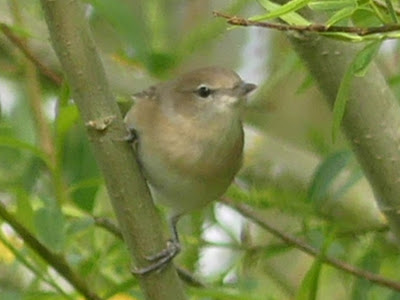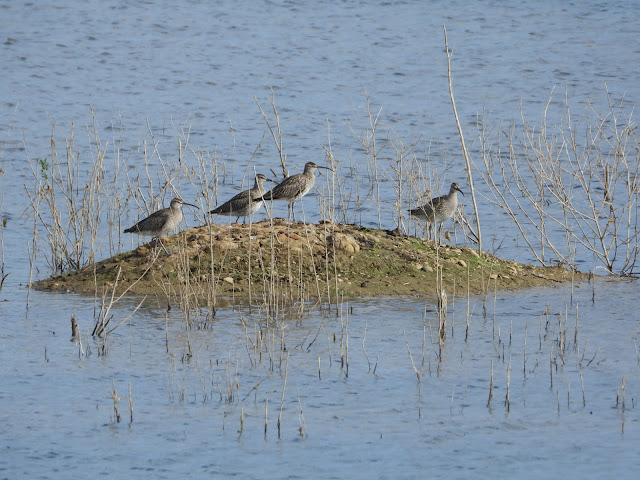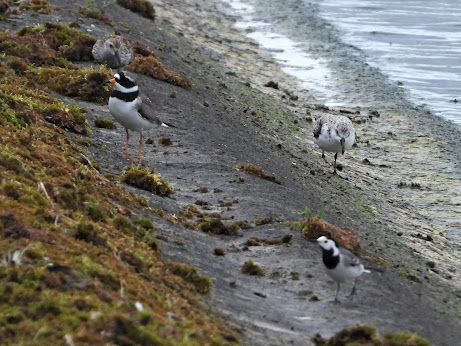Whimbrel on Noke Sides viewable from the bench between screen 1 and 2 (per Steve Sansom).
Blog Header Text
For questions you can contact Adam at: adamchartley "at" gmail "dot" com or Jason at: jasoncppk "at" yahoo "dot" co "dot" uk
Wednesday, 30 April 2025
Tuesday, 29 April 2025
Standlake Pit 60, 29 April am
1+ Hobby - distant along S shore reedbed
2 Common Tern
2 Shelduck
1-2 Oystercatcher
Lapwing still
1 Cuckoo
Kingfisher
1 Garden Warbler - singing by LL gate
Stephen Burch
Abingdon: Abingdon Marina: 29th April
Common Tern: One circling over the Thames by the sailing club early evening. SU497961. 17:50.
Phil Chapman
Otmoor rspb 29th April
Farmoor Reservoir 29th April
Otmoor rspb
Shillingford: Shillingford Bridge: 29th April
Shillingford: Shillingford Bridge
Garden Warbler 09:15.
2 Kingfisher 09:40.
2 Common Tern: Flying downstream. 09:45.
2 Cuckoo: Heard. 09:45.
5 Sedge Warbler: Numerous individuals singing alongside the Thames Path on the northern bank. 09:45.
Oliver Hedley
River Thame, south from Cuddesdon Mill: 29th April
Waterways Breeding Bird Survey for BTO
2 Goosander, Cuckoo, 3 Sedge and 4 Reed Warblers along the river.
Checklist here.
New Marston: New Marston Meadows: 29th April
Garden Warbler: Marston Hamms. One lesser whitethroat still. 09:23.
Steve Jennings
Monday, 28 April 2025
Farmoor Reservoir: 28th April
3 Red-crested Pochard: 2m, 1w. 09:33.
4 Common Tern 09:33.
Cuckoo 09:33.
Allen Luedtke
Shipton-on-Cherwell: 28th April
3 Cetti's Warbler: calling on the canal between Shipton and Enslow.
12 Cattle Egret: on a field alongside the canal.
5 Little Grebe: Pair with three young on Shipton Manor lake.
Woodstock: Shipton Slade Farm
Yellow Wagtail
Bob Pomfret
North Cross Valley Way 28th April
Farmoor Reservoir 28th April
Sunday, 27 April 2025
Warburg Reserve - 27th April 2025
Raven, Buzzard x 2, Nuthatch x 2, Garden Warbler, Bullfinch (m & f ), Coal Tit, Marsh Tit x 3,
Long-tailed Tit, Chiffchaff, Blackcap (m)
 |
| Bullfinch - male |
 |
| Garden Warbler |
Farmoor Reservoir: Pinkhill: 27th April
2 Cuckoo: One seen and heard and one heard only. 18:52.
Richard Parsons
Holton: Holton Wood: 27th April
Cuckoo: Calling in plantation to the east of Holton Wood. 12:30.
Cara Atkinson
Port Meadow: 27th April
Lesser Whitethroat: m. singing in the allotments.
2 Common Tern
2 Swift: Over Kingston Rd.
3 Egyptian Goose
Reed Warbler: m. singing in the allotment hedge.
Adam Hartley
Saturday, 26 April 2025
Rushy Common: 26th April
Negative newsProbable Eleonora's Falcon: SP384076. 15:13.
John Pimm
Weston-on-the-Green: 26th April
5 Swift: Birds feeding above Weston Manor and its Oak trees. Plenty of insects buzzing around. 10 days earlier than last year. 20:03.
David Williams
Appleford: Appleford GP: 26th April
Black Tern: Still present over south pond at 17:45, viewable from raised footpath by B4016. 17:48.
Ian Elkins
Witney: 26th April
2 Avocet: Two still on quarry pit north of Rushy Common at 15:40, viewable from North Cross Valley Way. 15:35.
7 Shelduck 15:35.
Great White Egret: North of Rushy Common. 15:35.
Yellow Wagtail: North of Rushy Common. 15:35.
2 Little Ringed Plover: In quarry north of Rushy Common. 15:35.
2 Oystercatcher: In quarry north of Rushy Common. 15:35.
8 Egyptian Goose: pair with six well-grown young. In quarry north of Rushy Common. 15:35.
2 Teal: pair. On quarry north of Rushy Common. 15:35.
Hobby: At Rushy Common. 15:35.
Ian Elkins
Appleford: Appleford GP: 26th April
Black Tern: Viewable from footpath by B4016. Flying around pit nearest to Appleford. 15:25.
Peregrine: Harassing the Black Tern. 15:25.
Reed Warbler: Singing in reedbed next to the footpath. 15:25.
Oliver Hedley
Appleford GPs 26th April
New Marston: New Marston Meadows: 26th April
2 Lesser Whitethroat: Marston Hamms. FoY. 10:39.
Sedge Warbler: Marston Hamms. FoY. 10:39.
16 Whitethroat: Marston Hamms. Unusually high count. Also 1 willow warbler, 12 chiffchaff and 10 blackcap. 10:39.
Steve Jennings
Port Meadow: 26th April
2 Egyptian Goose: SP499079. 08:30.
2 Shelduck: SP499079. 08:30.
Steve Goddard
Venn Mill: 25th April
Venn Mill
Great White Egret 15:00.
2 Little Egret 15:00.
Grey Heron 15:00.
26th April
3 Egyptian Goose 08:40.
30 Sand Martin: Feeding briefly then flew off. 08:40.
House Martin: With Sand Martins. 08:40.
Jed Cleeter
Friday, 25 April 2025
Henley-on-Thames: 25th April
12 Egyptian Goose: m/f. Plus 10 Goslings not very old by the bank. SU764823. 15:15.
Ralph Watts
Bicester Wetland Reserve 25th April
Visits this morning and late afternoon
1 Cuckoo
1 LRP
9 warbler species
A Peters C Oram
Key Holder Reserve
Farmoor April 25th 8-11am
Thursday, 24 April 2025
Lower Arncott: 24th April
3 Whimbrel: Low, flying northeast following the Ray. SP606183. 18:45.
Nicholas Boyd
RSPB Otmoor Thursday 24 April a.m.
Bittern 2 (booming at reedbed)
Cuckoo 1
Snipe (1 drumming)
Waterstock: 24th April
4 Hobby: Seen over scrub land adjacent 10 tee at Waterstock golf club. 16:05.
John Barnes
Farmoor Reservoir: 24th April
Lesser Whitethroat 14:10.
4 Sedge Warbler 14:10.
2 Reed Warbler 14:10.
Garden Warbler 14:10.
3 Willow Warbler 14:10.
Richard Parsons
Farmoor Reservoir: 24th April
Common Tern 14:06.
3 Sand Martin 14:06.
7 House Martin 14:06.
2 Swift 14:06.
Raven 14:06.
3 Grasshopper Warbler 14:06.
2 Cetti's Warbler 14:06.
Richard Parsons
King's Lock: 24th April
2 Grasshopper Warbler: Heard only. SP480101. 09:00.
Steve Goddard
Wednesday, 23 April 2025
Farmoor Reservoir: 23rd April
Arctic Tern: A single bird late pm with 3 Common Tern then flew North. 16:30.
9 Common Tern: Moved through North during the Afternoon. 16:30.
Shelduck: Flew around F1 then continued North. 16:30.
2 Peregrine: M&F over. 16:30.
Jed Cleeter
Venn Mill: 23rd April
Spotted Redshank: Briefly early am then flew off North. 07:45.
Yellow Wagtail 07:45.
Jed Cleeter
Farmoor Reservoir: 23rd April
Farmoor Reservoir
3 Red-crested Pochard 19:00.
3 Yellow Wagtail 17:45.
2 Common Sandpiper 17:45.
Dunlin 17:45.
Matthew Lloyd
Otmoor: RSPB reserve: 23rd April
Wood Sandpiper: Big Otmoor. 12:27.
2 Bar-tailed Godwit: Big Otmoor. 12:27.
Greenshank: Big Otmoor. 12:27.
13 Dunlin: Big Otmoor. 12:27.
2 Little Ringed Plover: Big Otmoor. 12:27.
Isaac West
Chipping Norton: 23rd April
Mandarin Duck: drk. On Swailsford Bridge Wetland Cornwell. SP284265. 11:16.
2 Little Egret: SP284265. 11:16.
Pied Wagtail: SP284265. 11:16.
4 Sand Martin: SP284265. 11:16.
5 House Martin: SP284265. 11:16.
30 Swallow: At least 30 hunting over the two areas of wetland and the small lake and marsh. SP284265. 11:16.
3 Reed Bunting: ad male. SP284265. 11:16.
Green Woodpecker: SP284265. 11:16.
Kestrel: ad male. SP284265. 11:16.
Steve Akers
Farmoor
Tuesday, 22 April 2025
Chinnor: Cement Works: 22nd April
2 Little Ringed Plover: North end of Lake 2b. 17:00.
David Stracey
Monday, 21 April 2025
Chipping Norton: 21st April
Stonechat: On the marsh nr Cornwell. SP283268. 19:00.
2 Teal: pair. SP283268. 19:00.
Little Grebe: SP283268. 19:00.
Water Rail: H/O. SP283268. 19:00.
2 Reed Bunting: ad male. SP283268. 19:00.
3 Swallow: SP283268. 19:00.
Steve Akers
Farmoor Reservoir: 21st April
Probable Whimbrel: Probable flew into F1 calling. 19:18.
Yacky Morris
Waterstock: River Thame: 20th April
5 Goosander: 2 pairs and lone male. Female prospecting around possible nest site. 07:30.
Grey Wagtail 07:30.
11 Blackcap 07:30.
9 Chiffchaff 07:30.
2 Kingfisher 07:30.
8 Swallow 07:30.
6 Whitethroat 07:30.
2 Reed Bunting 07:30.
Nick Marriner
Waterstock: River Thame: 20th April
21 Lapwing 07:30.
2 Bullfinch 07:30.
2 Yellow Wagtail 07:30.
2 House Martin 07:30.
Oystercatcher 07:30.
2 Gadwall 07:30.
18 Linnet 07:30.
8 Sedge Warbler 07:30.
2 Garden Warbler 07:30.
2 Raven 07:30.
Nick Marriner
LWV GPs: 21st April
Whimbrel 1, quarry opposite car park
Oystercatcher 2
Shelduck 1
Northern Cross Valley Way
Dunlin 10
Ringed Plover 3
Yellow Wagtail 13
Swift 1
Shelduck 6
Dix Pit
Ring-necked Duck 1f
Common Tern 3
Pit 60
Hobby 4
Cuckoo 1
Oystercatcher 2
Farmoor 6am - 12pm
Sunday, 20 April 2025
Sarsgrove: 20th April
Hobby: FOY flying through. 13:00.
Whitethroat: FOY here. 13:00.
Wheatear: male. 13:00.
Steve Akers
Otmoor: RSPB reserve: 19th April
Shelduck: On Gt Otmoor marsh. 19:56.
Paul Woodham
Otmoor: RSPB reserve: 19th April
Otmoor: RSPB reserve
2 Cuckoo: male and fem. 10:30.
2 Hobby: Viewed from cattle pens. 10:45.
Paul Woodham
Otmoor: Oddington Lane: 20th April
2 Great White Egret 16:00.
2 Shelduck 16:00.
2 Marsh Harrier: male and fem. 16:00.
Ian Elkins
Devil’s Punchbowl: 20th April
Farmoor Reservoir: 20th April
5 Common Tern: 2 & 3 moved through between 08:00 & 09:30. 08:00.
4 Yellow Wagtail: Through early am. 08:00.
Cuckoo: Singing Male. 08:00.
Common Sandpiper: F1 Causeway. 08:00.
Peregrine: male. Flew through N. 08:00.
2 Grasshopper Warbler: Singing Males. 08:00.
Lesser Whitethroat: Singing Male. 08:00.
4 Garden Warbler: Singing Males. 08:00.
5 Shoveler: On F1 early am. 08:00.
150 Sand Martin: Through N am. 08:00.
Jed Cleeter
Chipping Norton: 20th April
Peregrine: Bathing at the wetland at Swailsford Bridge wetland Cornwell. No sign of Greenshank. SP284265. 09:00.
Mandarin Duck: Drake. SP284265. 09:00.
Sedge Warbler: In full song. SP284265. 09:00.
3 Pied Wagtail: SP284265. 09:00.
4 House Martin: SP284265. 09:00.
3 Swallow: SP284265. 09:00.
Steve Akers
Saturday, 19 April 2025
Chipping Norton: 19th April
Barn Owl: Hunting at dusk over the rough pasture and marsh grass next to the small lake nr Cornwell. SP283268. 19:41.
Snipe: SP283268. 19:41.
Steve Akers
Chipping Norton: 19th April
Greenshank: First ever Greenshank observed on the Swailsford Bridge wetland this evening - feeding continuously - still present when I left at 19.30. SP285265. 18:36.
Mandarin Duck: drk. Flew over with Mallards. SP285265. 18:36.
Mute Swan: juv. SP285265. 18:36.
12 Canada Goose: SP285265. 18:36.
20 Mallard: At least 10 pairs which have paired up after courtship and mating. SP285265. 18:36.
Grey Heron: SP285265. 18:36.
Grey Wagtail: SP285265. 18:36.
2 Pied Wagtail: SP285265. 18:36.
5 Swallow: SP285265. 18:36.
2 Blackcap: SP285265. 18:36.
Steve Akers
Ardley: Ardley Field Quarry: 19th April
2 Shelduck 16:31.
Ringed Plover 16:31.
John Gough
Friday, 18 April 2025
Chipping Norton: 18th April
Peregrine: Perched on tree branch on the wetland at Swailsford Bridge when I arrived - then flew off up the Swail Valley; also four Roe Deer Does out playing and grazing. 19:14.
Steve Akers
Farmoor Reservoir 18th April
The Sprins , Witney: 17th April
The Sprins , Witney
2 Raven: Tumbling about probable breeding display. Some conflict with crows. SP363094. 02:25.
North Cross Valley Way
Peregrine: male. Flew in from West and perched on pylon to East. SP367084. 15:15.
Yellow Wagtail: Could've been more. On banks of 'floods' to west nr. road to tar lakes. SP367084. 15:15.
John Pimm
Thursday, 17 April 2025
Farmoor Reservoir: Causeway: 17th April
2 Sanderling: Still present on F2 side. 19:45.
Matthew Lloyd
Peep-o-Day Lane/ Drayton 17th April
RSPB Otmoor Thursday 17 April
Farmoor Reservoir 17th April
Farmoor: 17th April
Baulking: 12th April
Cuckoo: Belated report of a singing male last Saturday. 12:35.
Jed Cleeter
Northern cross valley way: 17th April
2 Ringed Plover: SP363078. 08:30.
3 Little Ringed Plover: SP363078. 08:30.
3 Oystercatcher: SP363078. 08:30.
2 Dunlin: SP363078. 08:30.
Green Sandpiper: SP363078. 08:30.
Yellow Wagtail: SP363078. 08:30.
Cuckoo: SP363078. 08:30.
Great White Egret: SP363078. 08:30.
2 Egyptian Goose: SP363078. 08:30.
Simon Myers
Garford: 16th April
2 Swallow: Back in their normal place at the farm. 11:00.
Richard Parsons
Chipping Norton: 17th April
Green Sandpiper: On the wetland at Swailsford Bridge Cornwell then flew to the faster flowing section. SP284265. 09:15.
Mandarin Duck: Drake flying over with Mallard. SP284265. 09:15.
2 Sedge Warbler: SP284265. 09:15.
Grey Wagtail: ad male. SP284265. 09:15.
Grey Heron: SP284265. 09:15.
Green Woodpecker: SP284265. 09:15.
Kestrel: ad male. SP284265. 09:15.
2 Blackcap: SP284265. 09:15.
3 Chiffchaff: SP284265. 09:15.
Steve Akers
Grimsbury Reservoir 17th April
Letcombe Bassett: 17th April
4 Yellow Wagtail: Near track on Holborn hill. 08:01.
Jed Cleeter
Wednesday, 16 April 2025
Farmoor Reservoir: 16th April
Turnstone: Resting along the causeway F1 side. 19:05.
Grasshopper Warbler: Reeling along edge of River Thames near Pinkhill. 19:05.
46 Sand Martin: Feeding over F1. 19:05.
Glen Pascoe
Lark Hill 16th April
Sonning Eye GPs: 16th April
Raven 14:30.
12 Egyptian Goose: m/f. With 10 well grown goslings. 14:30.
Ring-necked Parakeet: Over the. 14:30.
Ralph Watts
Chipping Norton: 16th April
2 Green Sandpiper: On the wetland at Swailsford Bridge Cornwell. SP284265. 09:30.
8 Swallow: SP284265. 09:30.
3 Pied Wagtail: SP284265. 09:30.
Steve Akers
Tuesday, 15 April 2025
Chinnor: Cement Works: 15th April
2 Little Ringed Plover: By the west screen Lake 2b. 10:00.
David Stracey
Otmoor: RSPB reserve: 15th April
5 Ringed Plover: Big Otmoor. 18:56.
2 Little Ringed Plover: Big Otmoor. 18:56.
3 Dunlin: Big Otmoor. 18:56.
Isaac West
Farmoor Reservoir 15th April
Caspian Gull 1 second calendar year
Stanton St. John: 15th April
Cuckoo: One calling on Woodperry estate. SP578102. 17:29.
David Brown
Drayton 1066: 15th April
Black-tailed Godwit: One on pit N of Drayton-Sutton Courtenay road. Also: Great White Egret 1 Shoveller 9+ Teal 2 Gadwall 11+ Sedge Warbler 2 singing. SU489942. 16:45.
Phil Chapman
Larkhill 15th April
Chipping Norton: 15th April
Peregrine: Perched on tree which lies on the wetland at Swailsford Bridge Cornwell - it preened and cleaned for over an hour after bathing. SP284265. 09:45.
Green Sandpiper: SP284265. 09:45.
Yellow Wagtail: SP284265. 09:45.
Sedge Warbler: FOY. SP284265. 09:45.
Little Egret: SP284265. 09:45.
Steve Akers
Abingdon: 15th April
Willow Warbler: One singing on S bank of Thames opposite Abbey Meadows. SU504970. 13:00.
Phil Chapman
Wantage: 13th April
Yellow Wagtail: One flew N over the market square late morning. SU398879. 18:07.
Phil Chapman
Port Meadow: 15th April
A round-up of recent sightings on Port Meadow:
Today
Common Tern on the flood
Garden Warbler in Burgess Field
Yesterday
Reed Warbler singing in the Trap Grounds
2 Shelduck
Sunday
3 Yellow Wagtail
2 Shelduck
Little Ringed Plover
Lesser Whitethroat in Burgess Field
Thomas Miller, Adam Hartley
Farmoor April 15th 06:00-08:45
Common Tern - 1 F2 remained after the Arctic flew off
Monday, 14 April 2025
Chimney: Chimney Meadows: 14th April
22 Cattle Egret: SP364008. 13:05.
Sam Prior
Venn Mill: 14th April
4 Little Ringed Plover
2 Shelduck
Hatford: Sandpit
4 Shelduck: 2 pairs - not very happy with each other.
Mark Merritt
















































